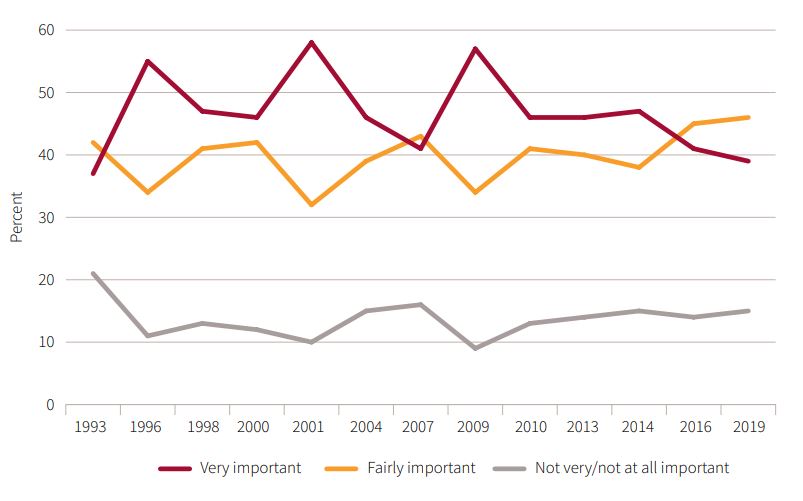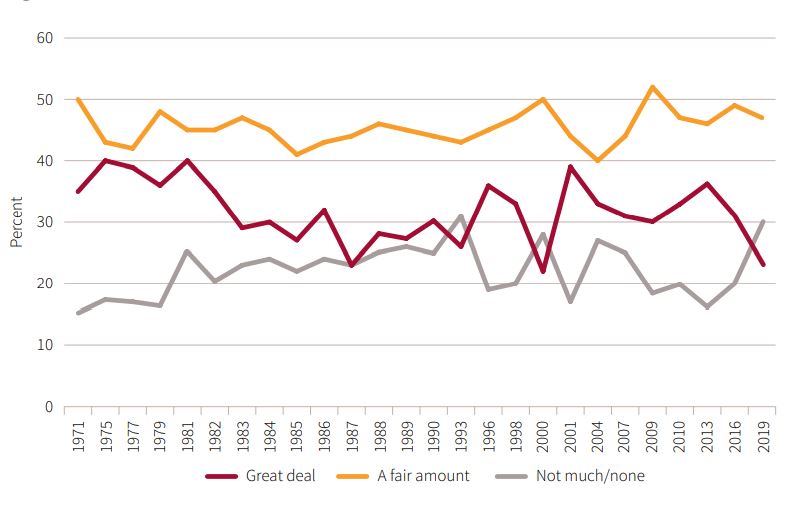ANZUS at 70: Public opinion and the alliance
Posted By Danielle Chubb and Ian McAllister on September 2, 2021 @ 12:30

Since 1951, when the ANZUS Treaty between Australia, New Zealand and the US was signed, the alliance with the US has been the cornerstone of Australian defence policy. From the public’s perspective, it’s one of the best recognised and understood aspects of contemporary Australian defence and attracts regular media attention and discussion.
The immediate post-war period also coincided with the rise of opinion polling in Australia. Borrowing techniques pioneered in the US in the 1930s by George Gallup, Keith Murdoch and his then employee, Roy Morgan, had introduced opinion polls in Australia in 1941. The organisation they created dominated Australian polling until the 1970s. Thanks to those and later polls, we possess a wealth of material about public views of relations with the US.
Post-war public opinion
Australia’s experience in World War II underscored the importance of the US to Australian security. While public opinion didn’t play a leading role in initiating the negotiations that led to the ANZUS Treaty, national sentiment about Australia’s position within the region was important in freeing the government to pursue a foreign policy shift away from Britain and towards the US.
That change resonated with the public. Three opinion polls conducted between 1944 and 1948 show increasing public concern about the possibility of a war with the Soviet Union within the next 25 years (Table 1). In 1944, the view that there would be war was held by 42% of the survey respondents, increasing to 67% by 1948. Interestingly, the proportion who didn’t have a view on the topic declined from almost a quarter of the respondents in 1944 to just 4% in 1948. This reflected the increasing frequency of public debate about the potential threats that were emerging in the region.
Public concern about the Soviet Union’s military intentions, as well as unease over the possibility of resurgent Japanese militarism, was accompanied by widespread dissatisfaction with the UN.
Table 1: Likelihood of another world war, 1944 to 1948 (%)
| 1944 | 1946 | 1948 | |
| Will be war | 42 | 62 | 67 |
| Will not be war | 34 | 18 | 29 |
| Undecided | 24 | 20 | 4 |
The public was therefore very receptive to the idea of a security treaty with the US. A survey question in June 1950—shortly before the North Koreans invaded South Korea—asked about a possible treaty. The survey showed that an overwhelming majority of the respondents—87%— supported Australia signing such a treaty, and just 7% opposed it (Table 2).
Table 2: Attitudes towards a treaty with the US, 1950 (%)
| Attitude | % |
| Favour | 87 |
| Oppose | 7 |
| Undecided | 6 |
Public support for the ANZUS Treaty
What’s the level of public support for the ANZUS Treaty today? Since the early 1990s, when the question was first asked in an opinion survey, a large majority of the public has viewed the treaty as important for protecting Australia’s security. Between eight and nine out of every 10 respondents have seen the treaty as either ‘very’ or ‘fairly’ important to Australia’s security, with peaks of support in 2001, immediately after the 9/11 attacks, and in 2009 (Figure 1). The lowest levels of public support were recorded in 1993, just after the collapse of the Soviet Union, and in 2019, during the presidency of Donald Trump.
Figure 1: Support for the ANZUS alliance, 1993 to 2019 (%)

‘How important do you think the Australian alliance with the United States under the ANZUS Treaty is for protecting Australia’s security?’
Sources: Australian Election Study; Survey of Defence Issues; ANUpoll.
Does the public have confidence in the US to meet its treaty obligations if it’s asked to? The extent to which the Australian public has trust in the US to defend Australia if we were attacked shows that the public has greatest confidence when the US has demonstrated a willingness to engage in overseas conflicts and play a major role in world affairs. Consequently, there was greatest trust immediately after the 9/11 attacks, when the US committed to the invasion of Afghanistan and then to the invasion of Iraq.
The trends also show several periods when trust in the US declined. The lowest level of trust occurred in 2000, just before 9/11 (Figure 2). That momentary decline may have been partly a public response to the US ruling out direct military involvement in the 1999 East Timor crisis.
The lower levels of trust in the mid-2000s also reflected the unpopularity of the free trade agreement with the US, ratified in 2004. The election of Trump and its full implications for US military involvement around the world were evident in 2019, when just 23% of respondents said they had ‘very great’ trust.
Figure 2: Trust in the US to defend Australia, 1971 to 2019

‘If Australia’s security were threatened by some other country, how much trust do you feel Australia can have in the United States to come to Australia’s defence?’
Sources: US Information Service; Australian Election Study; Survey of Defence Issues (question wording varied slightly).
The future of the ANZUS Treaty
While the ANZUS Treaty attracts widespread public support, social changes are one mechanism by which that support could erode. One source of change is generational and, as those who have personal experience of World War II and its aftermath leave the electorate, overall public support for the treaty may decline. A second source is immigration: as the ethnic composition of the population changes, that may have implications for public support for the alliance.
Analysis of the surveys suggests that, while age is a factor in support for ANZUS, its effect is less generation-than age-related. The passing of the World War II and immediate postwar generations wouldn’t appear to represent an existential threat to ANZUS. By contrast, being born overseas significantly reduces support for ANZUS, most notably from those born in Asia and Northern Europe. It would appear that large-scale immigration, particularly from within our region, is indeed changing overall support for the alliance, albeit gradually.
Much more important than immigration, however, is political leadership. This underpins the importance of elite consensus on the alliance. Calls to subject ANZUS, and the force deployments that arise from it, to greater public scrutiny and debate are opposed by political leaders for that very reason. For ANZUS to continue to attract widespread public support, politicians must resist turning it into a partisan battleground.
Conclusion
Australian public attitudes to the US–Australia alliance have been strongly consistent; even at times when the polls have reflected some concern or doubt about the role of the US in the region or, more broadly, in world affairs, the public has continued to express high levels of support for the alliance. As a result, while the election of Trump had a tangible effect on Australian public opinion of the US as a world leader, the changes observed in the surveys start from a high base when a large majority had an optimistic view of US relations, making the observed decline relative.
That observation is further strengthened when considering support for ANZUS over the full period for which polling data on these issues is available.2 Where there were observable changes over that time, they have been in the degree of support for the alliance. Respondents have shifted between ‘very important’ and ‘fairly important’ in their responses, rather than moving in the direction of seeing the alliance as unimportant. Moreover, the trends show that those taking a strong position in favour of ANZUS are proportionately greater than those who take a strong stance against it.
The elite, bipartisan consensus that we witness in Australian politics over the centrality of the US alliance to Australian foreign policy is both reflected and reinforced in the stable and continuing support the public has for this security relationship.
This article draws on Chapter 3 of Danielle Chubb and Ian McAllister, Australian public opinion, defence and foreign policy: attitudes and trends since 1945, Palgrave, London, 2020, where more details about the sources used are provided.
This post is an excerpt from ANZUS at 70: the past, present and future of the alliance [1], published by ASPI with support from the American Chamber of Commerce in Australia and edited by Patrick Walters.
Article printed from The Strategist: https://www.aspistrategist.org.au
URL to article: https://www.aspistrategist.org.au/anzus-at-70-public-opinion-and-the-alliance/
URLs in this post:
[1] ANZUS at 70: the past, present and future of the alliance: https://www.aspi.org.au/report/anzus-70-past-present-and-future-alliance
Click here to print.